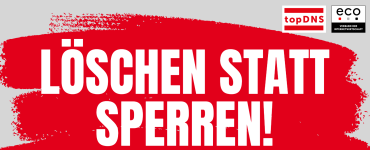- Transfer of ICANN control by September 2015 now in question: IGF must determine the process now
- Security and stability of the network architecture are central economic factors
- eco welcomes engagement of the German Federal Government for a strong multi-stakeholder model
Today, the 9th Internet Governance Forum (IGF) starts off in Istanbul. Over four days, the estimated 2,500 representatives of international governments, companies and NGOs, as well as participants from the civil society, will be exchanging ideas and information in current issues in Internet Governance, such as Internet administration, net neutrality, security and data protection, surveillance and intellectual property in the digital age. In the eyes of the Internet industry, of great importance will be the discussions on the reform process of the IANA supervision. This concerns a ruling about the future administration of the Internet address administrator, the Internet Corporation for Assigned Names and Numbers (ICANN). The Internet Assigned Numbers Authority (IANA) administers the root zone of the Domain Name System. It operates the thirteen root servers which form the starting point for the name resolution in the Internet.
Transfer of ICANN control by September 2015 now in question: IGF must determine the process now
Until now, the US Government has played a leading role in Internet administration, supervising the IANA function of ICANN through the Department of Commerce. However, the US Government has announced its intention to relinquish this role in September 2015. How the new organization of ICANN should look remains unclear and is the object of international negotiations. Yet there is not much time left. “In the IANA discussion, the focus is less on the content than on the process which needs to be determined,” says eco Chairman of the Board Michael Rotert. “If the IGF in Istanbul does not succeed in determining the role and the contribution that the IGF wants to have in the new organization, as well as implementing a coordinated process for the clarification of these questions, then I doubt that it will be possible to work out an alternative solution by September 2015. Then it will be all the more likely that the US will extend its contract once more,” say Rotert.
Security and stability of the network architecture are central economic factors
The security, stability, capacity and resilience, as well as the trustworthiness of the Internet infrastructure and network infrastructure safeguards the innovative capability of the Internet and forms the foundation for economic growth and a prosperous digital ecosystem. “For us, the reliability of the system of IP address allocation and domain names is of the highest priority,” says Michael Rotert. “Our member companies depend on secure, stable, robust and interoperable Internet infrastructures. As a result, independent of the discussion on the IANA reform, it is essential that stability and security can be guaranteed in the allocation and coordination of central Internet resources such as domain names and IP addresses. This has worked well in the past, and should be the core objective of any new self-administration system”, Rotert emphasizes.
eco welcomes engagement of the German Federal Government for a strong multi-stakeholder model
The majority of Internet users (around 40 %), according to a representative survey in February this year commissioned by eco and undertaken by TNS Infratest, are of the opinion that the EU should take on more responsibility for Internet Governance in the future, closely followed by international organizations like the United Nations (UN), which 35 % of users would like to see more strongly involved. At the same time, one third of those surveyed (32 %) also see a direct responsibility for Internet Governance amongst the users themselves.
This public opinion speaks for the building of a strong multi-stakeholder model for Internet administration, as the recently published eco paper Guidelines for the Future Design of Internet Governance calls for: “The multi-stakeholder model has proven to be a tried and tested concept for the dialog between various players and for the regulation of fundamental Internet functions. In order to strengthen it long-term, we need a strong legitimation process for all institutions and people that are involved in Internet Governance,” says Michael Rotert. The supervision of Internet administration by national governments or an intergovernmental organization would be no alternative, Rotert believes.
eco therefore expressly welcomes the upward revaluation that the topic Internet Governance has experienced in the context of the German Federal Government’s Digital Agenda. With the announcement from the USA of their intention to relinquish their supervisory role of the important Internet Assigned Names and Numbers (IANA), new room to maneuver has been created in Internet Governance, which both the Federal Government and the European Union should make use of. Particularly in light of the impending discussion, the positive statement about the German Federal Government’s participation in the new orientation of ICANN is the right signal for Germany as an economic center.
The eco Guidelines for the Future Design of Internet Governance are available for download here.
More information on the eco Survey on Internet Governance can be found here.




